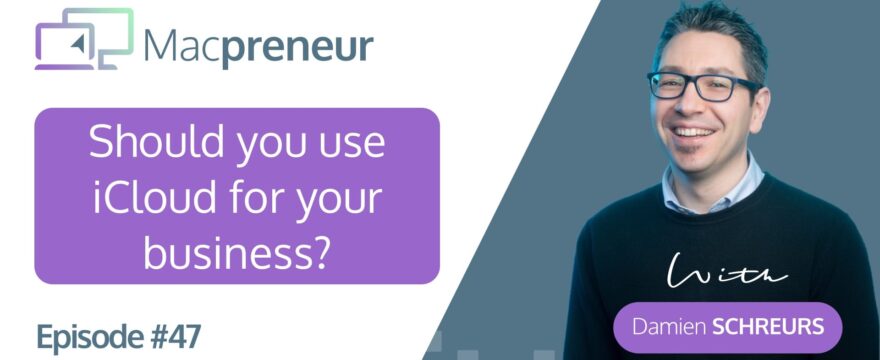Show notes
So, in today’s show, you’ll learn what iCloud is about.
The purpose of this episode is to help you decide whether or not you should use iCloud for your business, and if so, which of its services.
What is iCloud?
iCloud is a brand name for a collection of cloud storage and cloud computing services that use Apple operated servers located all around the world:
- Some data is stored in their own data centres:
- 6 in the US
- 2 in Europe
- 3 in Asia
- Some on Amazon Web Services
- Some on Microsoft Azure
- Since 2016, some iCloud Services use the Google Cloud Platform
It’s a collection of services that work across iOS, macOS, tvOS, watchOS and even Microsoft Windows.
Which services?
- iCloud Drive
- iCloud Backup (for iOS devices only)
- iCloud Photo Library
- iCloud Photo Sharing
- iCloud Music Library
- iCloud Mail
- iCloud Calendar
- iCloud Contacts
- iCloud Notes
- iCloud Reminders
- iCloud Bookmarks & Tab
- Messages on iCloud
- Health data sync
- Home data sync
- Find My
- and more …
iCloud is accessible from a device, through a native or a third party app and for some service via iCloud.com.
iCloud data:
- will always transit through one of Apple’s operated server (not peer-to-peer)
- is encrypted during transit and at rest (when saved in the cloud)
BUT for most services Apple controls the encryption/decryption keys.
Here are the data that Apple cannot decrypt:
- iCloud keychain (our passwords)
- Health data
- Home data
- Payment information stored in Wallet
Why? Because there is a second layer of protection based on the passcode of 1 or more devices linked to our iCloud account.
All the other data, including iOS backups and iCloud Drive can be decrypted by Apple (ex. lawful request from a government authority or rogue employee with adequate credentials).
To log into iCloud, we use our Apple ID and password.
For some services, two-factor authentication is required, like Messages on iCloud.
Two-factor authentication prevents someone discovering your password to log into your account BUT it doesn’t prevent Apple from accessing your data.
Therefore, Macpreneurs should really think twice about the kind of data they want to store in the multitude of iCloud services.
Lastly, what about the reliability?
Unfortunately, Apple has not a good track record:
- With iCloud Drive, incidents have happened during which some customers have lost files. This usually happens when they roll out new features or during the beta testing period of iOS or macOS (i.e. Linea during iOS 13 beta testing phase)
- Personally, I’ve lost a note I took during a client meeting after moving it from one folder to another. Poof, gone. It didn’t show up in the Recently deleted folder and there’s no recovery mechanism on iCloud.com. Luckily, I had printed the note as PDF and stored it in my CRM
- On top of this, the service can be interrupted at times => Important to bookmark and check: https://www.apple.com/support/systemstatus
iCloud services and Macpreneurs
Tough to find the balance between convenience & security (source: Steve Gibson from GRC and the Security Now podcast
Must-use iCloud service = iCloud backup for iOS devices. Why?
- There’s no alternative
- Best to have an automatic backup that Apple can decrypt THAN no backup at all
- Therefore Macpreneurs must invest in iCloud Storage
Safe to use iCloud services;
- iCloud Keychain
- Health and Home data
- Wallet
Beware of these iCloud services;
- iCloud Notes => No recovery in case of glitch
- iCloud Drive => OK for non business-critical data and non confidential information
- I sync my Keynote and Pages documents
- I temporarily store scanned receipts via Scanbot then use Hazel to file it away
- For confidential information, I recommend to use a tool like Boxcryptor that adds a second layer of encryption
- iCloud Contacts
- OK for personal contacts
- Not so much for professional one (especially since GDPR)
- No secure and native way to sync iCloud contacts to Android
- iCloud Calendar
- Be careful about client information in calendar title or note
- Tricky to migrate to another provider afterwards (G Suite or Microsoft Exchange)
Conclusion & recommendation
Macpreneurs should:
- be careful when choosing which iCloud Services to use for their business.
- only use the minimum amount of necessary iCloud services and store non-confidential information
- prefer business-tailored solutions like G Suite or Microsoft Office 365 to store and sync contacts, calendars and notes for multiple reasons:
- better reliability
- better suited for GDPR (can choose the server where the data is stored)
